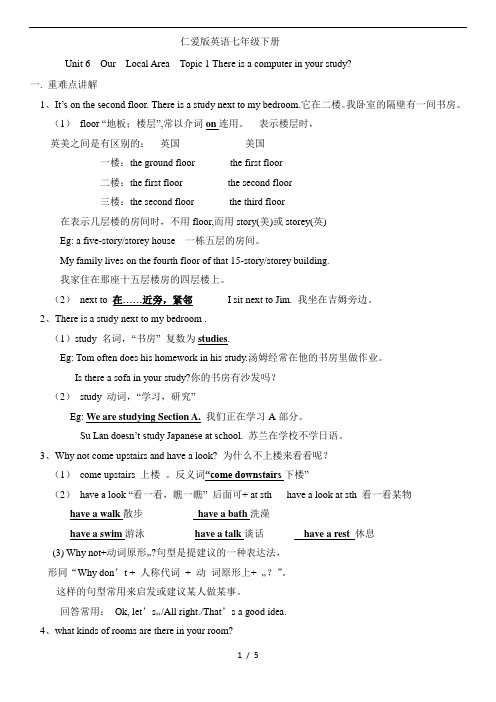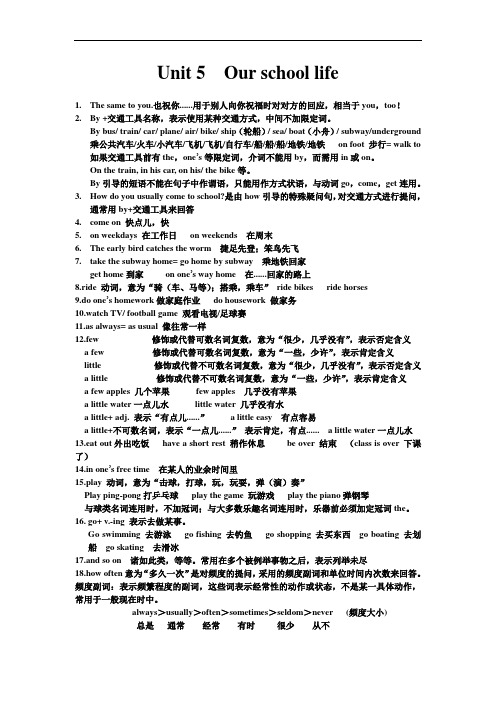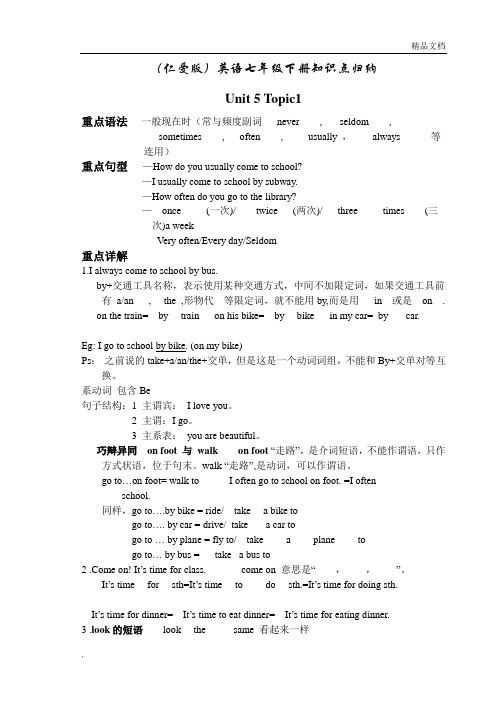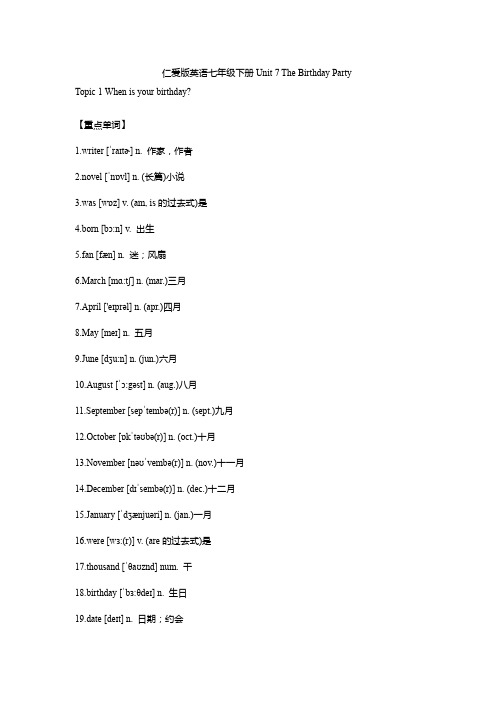仁爱版七年级下册英语重难点归纳
仁爱版英语七年级下册Unit6 Topic-1知识点

仁爱版英语七年级下册Unit 6 Our Local Area Topic 1 There is a computer in your study?一. 重难点讲解1、It’s on the second floor. There is a study next to my bedroom.它在二楼。
我卧室的隔壁有一间书房。
(1)floor “地板;楼层”,常以介词on连用。
表示楼层时,英美之间是有区别的:英国美国一楼:the ground floor the first floor二楼:the first floor the second floor三楼:the second floor the third floor在表示几层楼的房间时,不用floor,而用story(美)或storey(英)Eg: a five-story/storey house 一栋五层的房间。
My family lives on the fourth floor of that 15-story/storey building.我家住在那座十五层楼房的四层楼上。
(2)next to 在……近旁,紧邻I sit next to Jim. 我坐在吉姆旁边。
2、There is a study next to my bedroom .(1)study 名词,“书房” 复数为studies.Eg: Tom often does his homework in his study.汤姆经常在他的书房里做作业。
Is there a sofa in your study?你的书房有沙发吗?(2)study 动词,“学习,研究”Eg: We are studying Section A.我们正在学习A部分。
Su Lan doesn’t study Japanese at school. 苏兰在学校不学日语。
3、Why not come upstairs and have a look? 为什么不上楼来看看呢?(1)come upstairs 上楼。
仁爱英语七年级下册知识点总结

七年级下册知识点总结Unit 5 Topic1重点短语on foot go …on foot = walk ( to )…at the school gate在学校大门口on weekdays 在平日 ,在工作日on weekends=on the weekend在周末after school 放学后after class 下课后after breakfast / lunch / supper早餐/ 午餐/ 晚餐后in ones free time在某人空闲时间have a rest 休息一下read books 读书go swimming 去游泳listen to music 听音乐watch TV 看电视do(one’s)homework 做作业go to the zoo / park 去动物园/ 公园once a week 一周一次every day 每天have classes 上课for a little while 一会儿go to bed 上床睡觉come on 快点,加油,来吧get up 起床talk with / to sb.与某人谈话at school 在学校、在上课go to school 去上学and so on ……等等重点句型Happy New Year! The same to you.Your new bike looks very nice. Thank you.How do you usually come to school? —I usually come to school by subway.How often do you go to the library?—Once/Twice/Three times a week/Very often/Every day/SedomThe early bird catches the work. (谚语) 笨鸟先飞Work / Study must come first. 工作/ 学习必须放在第一位!Classes begin at eight. =Class begins at eight.What time does the class begin? / What time do the classes begin?We have no more time. 我们没有更多的时间了。
(完整版)仁爱版七年级英语下册知识点总结

Unit 5 Our school life1.The same to you.也祝你......用于别人向你祝福时对对方的回应,相当于you,too!2.By +交通工具名称,表示使用某种交通方式,中间不加限定词。
By bus/ train/ car/ plane/ air/ bike/ ship(轮船)/ sea/ boat(小舟)/ subway/underground 乘公共汽车/火车/小汽车/飞机/飞机/自行车/船/船/船/地铁/地铁on foot 步行= walk to 如果交通工具前有the,one’s等限定词,介词不能用by,而需用in或on。
On the train, in his car, on his/ the bike等。
By引导的短语不能在句子中作谓语,只能用作方式状语,与动词go,come,get连用。
3.How do you usually come to school?是由how引导的特殊疑问句,对交通方式进行提问,通常用by+交通工具来回答e on 快点儿,快5.on weekdays 在工作日on weekends 在周末6.The early bird catches the worm 捷足先登;笨鸟先飞7.take the subway home= go home by subway 乘地铁回家get home到家on one’s way home 在......回家的路上8.ride 动词,意为“骑(车、马等);搭乘,乘车”ride bikes ride horses9.do one’s homework做家庭作业do housework 做家务10.watch TV/ football game 观看电视/足球赛11.as always= as usual 像往常一样12.few 修饰或代替可数名词复数,意为“很少,几乎没有”,表示否定含义a few 修饰或代替可数名词复数,意为“一些,少许”,表示肯定含义little 修饰或代替不可数名词复数,意为“很少,几乎没有”,表示否定含义a little 修饰或代替不可数名词复数,意为“一些,少许”,表示肯定含义a few apples 几个苹果few apples 几乎没有苹果a little water一点儿水little water 几乎没有水a little+ adj. 表示“有点儿......” a little easy 有点容易a little+不可数名词,表示“一点儿......”表示肯定,有点...... a little water一点儿水13.eat out外出吃饭have a short rest 稍作休息be over 结束(class is over 下课了)14.in one’s free time 在某人的业余时间里15.play 动词,意为“击球,打球,玩,玩耍,弹(演)奏”Play ping-pong打乒乓球play the game 玩游戏play the piano弹钢琴与球类名词连用时,不加冠词;与大多数乐趣名词连用时,乐器前必须加定冠词the。
(仁爱版)英语七年级下册知识点归纳与总结

(仁爱版)英语七年级下册知识点归纳Unit 5 Topic1重点语法一般现在时(常与频度副词___never____, ___seldom____,___sometimes____,___often____, ___usually_,____always______等连用)重点句型—How do you usually come to school?—I usually come to school by subway.—How often do you go to the library?—__once_____(一次)/____twice___(两次)/___three ___times____(三次)a weekVery often/Every day/Seldom重点详解1.I always come to school by bus.by+交通工具名称,表示使用某种交通方式,中间不加限定词,如果交通工具前有_a/an___, __the_,形物代_ 等限定词,就不能用by,而是用___in__或是__on__.on the train=__by__ train on his bike=__by__ bike in my car=_by___ car.Eg: I go to school by bike. (on my bike)Ps:之前说的take+a/an/the+交单,但是这是一个动词词组,不能和By+交单对等互换。
系动词包含Be句子结构:1 主谓宾:I love you。
2 主谓:I go。
3 主系表:you are beautiful。
巧辩异同on foot 与walk on foot “走路”,是介词短语,不能作谓语,只作方式状语,位于句末。
walk “走路”,是动词,可以作谓语。
go to…on foot= walk to I often go to school on foot. =I often ________school.同样,go to….by bike = ride/__take__ a bike togo to…. by car = drive/_take___ a car togo to … by plane = fly to/__take__ __a__ __plane__ __to__go to… by bus =___take_ a bus to2 .Come on! It’s time for class. come on 意思是“____,____,____”。
仁爱英语七年级下册Unit5课本重点总结

仁爱英语七年级下册Unit5课本重点总结Unit 5 Topic1重点知识复总结1.---Happy New Year!---The same to you.Happy birthday!---Thank you.2.Your new bike looks very nice!It looks nice on you.(这两句均为系表结构)3.I usually come to school by subway。
(提问)How do you usually come to school?Do you often come to school by bike?Yes。
I do.4.You mean you usually come to school by underground?此处mean为动词“意思是…”常见句型:What do you mean?你什么意思?meaningn.意思XXX.5.You’re right。
/ That’s right.承认对方说法。
That’s all right.不消谢。
6.It's time for class。
= It’s time to have classes.7.He comes to school on foot.= He walks to school.She goes to school by bus.= She takes a bus to school.XXX.XXX.8.Kankang meets Jane at the school gate.XXX foot步行(此类均为介词短语)10.I usually get up at about six o’clock on weekdays。
(提问)What time do you usually get up on weekdays?11.The early bird catches the worm.12.XXX XXX to school.He sometimes takes the train to Xinxiang.He often comes on foot.Sally usually takes a plane to the USA.Lucy always takes a bus to Xinxiang.13.Classes begin at eight。
仁爱版英语七年级下册unit7重难点知识归纳总结

仁爱版英语七年级下册Unit 7 The Birthday Party Topic 1 When is your birthday?【重点单词】1.writer [ˈraɪtɚ] n. 作家,作者2.novel [ˈnɒvl] n. (长篇)小说3.was [wɒz] v. (am, is的过去式)是4.born [bɔ:n] v. 出生5.fan [fæn] n. 迷;风扇6.March [mɑ:tʃ] n. (mar.)三月7.April ['eɪprəl] n. (apr.)四月8.May [meɪ] n. 五月9.June [dʒu:n] n. (jun.)六月10.August [ˈɔ:gəst] n. (aug.)八月11.September [sepˈtembə(r)] n. (sept.)九月12.October [ɒkˈtəʊbə(r)] n. (oct.)十月13.November [nəʊˈvembə(r)] n. (nov.)十一月14.December [dɪˈsembə(r)] n. (dec.)十二月15.January [ˈdʒænjuəri] n. (jan.)一月16.were [wɜ:(r)] v. (are的过去式)是17.thousand [ˈθaʊznd] num. 千18.birthday [ˈbɜ:θdeɪ] n. 生日19.date [deɪt] n. 日期;约会20.calendar [ˈkælɪndə(r)] n. 日历21.plan [plæn] v. &n. 计划,打算22.celebrate ['selɪbreɪt] v. 庆祝23.party ['pɑ:tɪ] n. 聚会,宴会;党派24.fourth [fɔ:θ] num. 第四25.fifth [fɪfθ] num. 第五26.sixth [sɪksθ] num. 第六27.seventh ['sevnθ] num. 第七28.eighth [eɪtθ] num. 第八29.ninth [naɪnθ] num. 第九30.tenth [tenθ] num. 第十31.eleventh [ɪ'levnθ] num. 第十一32.twelfth [twelfθ] num. 第十二33.twentieth ['twentɪəθ] num. 第二十34.present ['preznt] n. 礼物35.shape [ʃeɪp] n. 形状v. 使成为……形状36.ball [bɔ:l] n. 球;舞会37.afraid [əˈfreɪd] adj. 担心;害怕38.star [stɑ:(r)] n. 星;明星39.mouse [maʊs] n. 老鼠40.square [skweə(r)] n. 正方形;广场;平方adj. 正方形的41.circle ['sɜ:kl] n. 圈,圆圈v. 圈出42.triangle ['traɪæŋɡl] n. 三角形43.rectangle [ˈrektæŋgl] n. 长方形;矩形44.oval ['əʊvl] n. 椭圆adj. 椭圆形的45.centimeter ['sentɪˌmi:tə] n. (cm)厘米46.Mrs. [ˈmɪsɪz] n. 太太,夫人47.cake [keɪk] n. 蛋糕【重点短语】1.be born 出生2.look at 看3.plan to do sth. 计划做某事4.have a birthday party 举办生日聚会5.the shape of ……的形状6.be like 像……7.how long 多长8.how wide 多宽e ... for ... 用……做……【重点句型】1.—When were you / was he/she born?你/他/她是什么时候出生的?—I/He/She was born on/in …我/他/她出生于……2.—Where were you / was he/she born?你/他/她在哪里出生的?—I/He/She was born in …我/他/她出生在……3.—When is your birthday?你的生日是什么时候?—May 13th.5月13号。
仁爱英语七年级下册知识点归纳

你什么的样子真美作文篇一:你坚守的样子真美“江山不负英雄泪,且将利剑破长空”在九百六十万平方公里的土地上,在祖国西部,在神秘的喀喇昆仑高原上,有一群人如雪莲般绽放,如松柏般挺拔,无时无刻不在守卫着祖国的疆土,他们就是——戍边战士。
“清澈的爱,只留给祖国。
”18岁的陈祥榕用生命热爱着祖国。
2020年6月面对公然来犯的印军的钢管、棍棒的攻击,陈祥榕突出重围,奋力反击,用身体死死地护住战友。
在战斗结束时才发现陈祥荣紧紧趴在营长的身上,他的生命也永远定格在了保护营长的那一刻。
十八岁的少年用略显青涩的面容和还没有足够力量的臂膀,守护住了他的祖国。
陈祥榕牺牲时,距离他边疆入伍不过半年时间,那个从海边来的少年永远留在了山的那边。
“宁将鲜血流尽,不失国土一寸。
”这句话深深地刻入了每一个边疆战士的心中。
我们享受祖国的富饶和强大时,他们用青春和热血坚守着。
战士王焯冉在和战友支援一线时,湍急的河流将部队冲散,在生与死的刹那间,王焯冉毅然将战士战友推上岸,把自己留在了刺骨的激流中。
无数戍边战士用军人的担当,在这片坚硬的土地上深深地扎下根,让国旗在这里高高飘扬。
他们朴实无华,他们只是千千万人民中的一员,但正是这样一群普普通通的人,用他们的生命捍卫祖国的边疆。
“勿忘国耻,兴我中华”,千千万万的战士用生命捍卫着祖国的主权和尊严,无数的医生护士用信念和死神赛跑,千万名建筑工人用双手建设祖国。
在新时代的今天,我们正以生命起誓,誓将祖国建设的更加强大富饶。
篇二:你孤独的样子真美你今天是一个孤独的怪人,你离群所居,总有一天,你会成就一个民族。
你于江边立足,如今虽为初夏,但岸边的兰枝草却已茂密,幽幽的绿色泛着冷意。
起风了。
岸边的冷意更甚,兰草伴着风,如浪涛般一层又一层翻滚。
白衣勾出了你细瘦的身影,撩起长发,面容枯败,只有你眼中依旧深不见底,而你的心底还留着尚未完全退去的热血与赤诚,你又何尝不愿去痛恨啊!恨怀王亲信小人,错将珷玞当美玉;恨这世上再无伯乐,无人赏识千里马;更恨如今奸臣当道,而你有心报国却报国无门。
仁爱版七年级英语下册知识点总结

仁爱版七年级英语下册知识点总结仁爱版七年级英语下册知识点总结在日常过程学习中,说到知识点,大家是不是都习惯性的重视?知识点也可以通俗的理解为重要的内容。
哪些才是我们真正需要的知识点呢?以下是店铺为大家收集的仁爱版七年级英语下册知识点总结,仅供参考,大家一起来看看吧。
仁爱版七年级英语下册知识点总结 1㈠短语总结1. 在学校大门口 at the school gate2. 来学校 come to school3. 去学校 go to school4. 上课 have class / have classes5. 步行 on foot6. 骑自行车 ride a bike/ ride bikes/ by bike / on a bike7. 坐公交 by bus / take a bus8. 坐地铁 by subway / take the subway / on the subway9. 坐飞机 by plane/ take the plane / on the plane10. 坐小汽车 by car / in a car/ take a car/ drive a car11. 坐轮船 by ship12. 坐小船 by boat13. 坐火车 by train / on the train14. 在我们组 in our group15. 一群学生 a group of students16. 我们中的三个人 three of us17. 在平日 on weekdays18. 在周末 on the weekends / at weekends19. 起床 get up20. 睡觉 go to bed21. 早起 get up early22. 回家 go home23. 到家 get home24. 去动物园 go to the zoo25. 去公园 go to the park26. 看电影 see a movie / film27. 看电视 watch TV28. 在晚上 in the evening / at night29. 帮助父母 help parents30. 做某人的家庭作业do one’s ( my/ her/ his/ your/ their)homework31. 在学校 at school32. 知道,了解 know about / learn about33. 校园生活 school life34. 一个美国学生 an American student35. 在美国 in America / in the U.S.A.36. 许多学生many students/ a lot of students/ lots of students37. 很少 very few38. 吃午饭 have lunch39. 出去吃饭 eat out40. 在校期间 on school days41. 休息一会 have a short rest/ break42. 午饭后 after lunch43. 在某人的业余时间in one’s ( my/ his/ her/ their…)free/ spare time44. 打篮球 play basketball45. 踢足球play soccer / football46. 弹钢琴 play the piano47. 弹吉他play the guitar48. 拉二胡 play erhu49. 去游泳 go swimming / go for a swim50. 去划船 go boating51. 球赛 a ball game / ball games52. 一年四次 four times a year53. 听音乐 listen to music54. 读书 read books55. 看报 read newspapers56. 看医生 see a doctor57. 去图书馆 go to the library58. 一周两次 twice a week59. 见朋友 meet friends60. 每天 every day61. 在七点半 at half past seven62. 一小会 for a little while / for a short time63. 晚饭后 after supper64. 吃饭 have dinner65. 吃早饭 have breakfast㈡重要句型1. I usually come to school by subway.同义句: I usually take the subway to school.对划线部分提问: How do you usually come to school?类似的有:go to school by bike=go to schoolon a bike= ride a bike to school=ride to schoolgo home by bus=go home on a bus=take a bus home2. How do you us ually/ often…?你通常/经常怎样…?3. It’s time for class.=It’s time to have class. =It’s time for having class.4. What about you? =How about you?5. How often …? 询问频率,回答可以用频率副词:always,usually, often, sometimes, seldom, never, every day ,every +其他时间名词或表示频率的短语回答表示频率的短语:次数+单位时间e.g. : once a day / twice a week / three times a month6. The early bird catches the work. (谚语) 笨鸟先飞7. Work / Study must come first. 工作/ 学习必须放在第一位!8. Classes begin at eight. =Class begins at eight.提问: What time does the class begin? / What time do the classes begin?㈢重要单词的用法1. look (感官动词) 看起来,后面加形容词His mother looks very young.They look very cute.Her dress looks very nice.You look very cool in this coat.2. by 介词by 后面直接加表示交通工具的名词,中间不用任何词修饰,如:by bikeby +动词ing形式,表示通过某种方式People show love to their mothers by giving cards.You can be a good student by working hard.3. over (形容词)School / Class is over.4. begin现在分词: beginning 过去式: beganbegin to do sth , begin doing sthHe begins to write a letter. =He begins writing a letter.如果begin本身为分词,只能用begin to do sthHe is beginning to run.5. listen to 听(动作) , hear 听见(结果)6. always 反义词 never7. 本话题涉及的时态为一般现在时,句中常有频率副词或表示频率的短语,如果主语为三单,动词一定要用三单!仁爱版七年级英语下册知识点总结 21.短语归纳:Your name你的名字first name名字last name姓氏her name 她的名字telephone /phone number电话号码in China在中国2.必背典句:1.—nice to meet you!见到你很高兴!—Nice to meet you,too.见到你我也很高兴。
- 1、下载文档前请自行甄别文档内容的完整性,平台不提供额外的编辑、内容补充、找答案等附加服务。
- 2、"仅部分预览"的文档,不可在线预览部分如存在完整性等问题,可反馈申请退款(可完整预览的文档不适用该条件!)。
- 3、如文档侵犯您的权益,请联系客服反馈,我们会尽快为您处理(人工客服工作时间:9:00-18:30)。
仁爱版七年级下册英语重难点归纳
仁爱版七年级下册英语重难点归纳:
1. 动词的时态和语态:如一般现在时、一般过去时、现在进行时、被动语态等。
学生需要掌握各种动词时态和语态的用法,并能正确运用于句子中。
2. 名词的单复数:学生需要掌握名词的单复数形式,包括一般名词、不规则名词等,并能正确运用于句子中。
3. 代词的用法:包括人称代词、物主代词、指示代词、不定代词等。
学生需要学会使用不同类型的代词,并能正确运用于句子中。
4. 形容词和副词的用法:学生需要学会形容词和副词的比较级和最高级形式,以及其用法和搭配。
5. 动词的不规则变化:学生需要掌握一些常见的动词的不规则变化形式,如go-went,have-had等,并能正确运用于句子中。
6. 基本句型和句子结构:学生需要掌握一些基本的句型和句子结构,如主谓结构、主谓宾结构、there be句型等,并能正确
运用于句子中。
7. 复合句的构建:学生需要学会构建复合句,包括主从复合句和并列复合句,并能正确使用连词和标点符号连接句子。
8. 词汇的记忆和运用:学生需要记忆和掌握课文中的重要词汇,并能正确运用于句子中,同时还需进行词义辨析和词组搭配的练习。
9. 听力和口语训练:学生需要进行听力和口语训练,提高听说能力,理解和运用英语句子和对话。
10. 阅读和写作能力的培养:学生需要进行阅读和写作训练,
提高阅读理解和写作表达能力,学会正确理解和运用各种文章和写作形式。
